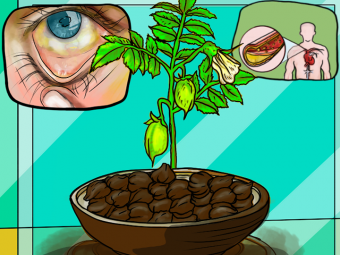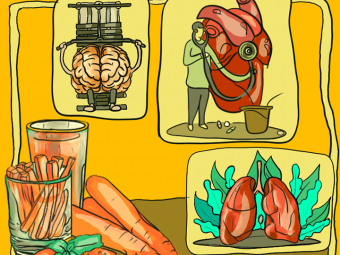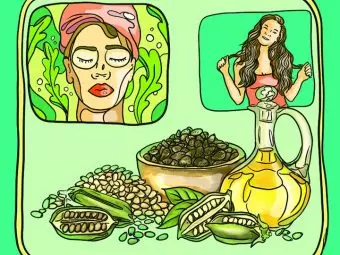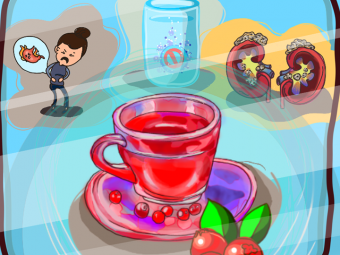Quail eggs are small, nutrient-dense eggs of quails. These medium-sized birds are found in Asia and Europe, and are scientifically known as Coturnix-coturnix japonica. Quail eggs benefit human health in many ways. They are mostly used in Chinese medicine for treating many health issues.
These eggs were identified as sustainable food in underdeveloped countries and also as an alternative food resource by The Food and Agriculture Organization (FAO). This development can be attributed to their high nutrient content. Bodybuilders use these eggs as dietary supplements.
Learn more about the many benefits quail eggs offer, their nutrition facts, and the side effects associated with their overconsumption. Continue reading.
In This Article
Quail Egg Nutrition
- Quail eggs are rich in calories (158), total fat (11 g), saturated fat (3.6g), cholesterol (844 mg), sodium(141 mg), protein (13 g), vitamin D (55 mcg) calcium (64 mg), iron (3.65 mg), and potassium (132 mg) (1).
- They are also rich in antioxidants, selenium, lecithin, iodine, and choline (1).
Quail eggs have been known to improve immunity, boost bone health, manage diabetes, promote healthy skin, and prevent hair loss. They are also claimed to help manage depression and improve sexual health and eyesight. Let us look at these benefits in detail.
18 Health And Beauty Benefits Of Quail Eggs
1. Quail Eggs Are Nutrient-Rich
Quail eggs are three to four times more nutritious than chicken eggs. Quail eggs contain 13% protein, while chicken eggs contain only 11%. They also have almost 3 times more vitamin B1 and double the vitamin B2 and vitamin A as chicken eggs (1), (2). According to USDA’s national nutrient database, a quail egg is rich in vitamin E, amino acids, fatty acids, iron, and zinc (1), (2), (3). In certain cases, chicken eggs can cause allergic reactions with symptoms such as nausea, vomiting, stomach ache, and rashes (4). Quail eggs, on the other hand, are hypoallergenic and safe to consume.
2. May Help In Treating Respiratory Disorders
Ancient medicinal practices involved using quail eggs to treat asthma and bronchitis. A study published in Food Science & Nutrition found a dietary supplement with quail eggs to be effective in easing the symptoms of allergic rhinitis (5).
3. May Help Treat Allergies
Quail eggs may help treat allergies because of the presence of ovomucoid, an enzyme (trypsin) inhibitor (6).
A study conducted in China on mice found that quail eggs may help soothe the symptoms of food allergies. They inhibited the activity of transcription factors that regulate the pathways involved in the inflammation of the esophagus (7). However, research is required on human subjects to prove this benefit.
4. May Help Manage Diabetes
Quail eggs have been implicated in managing diabetes. A study conducted on diabetic rats has shown that quail eggs reduce blood glucose and creatinine levels. It also showed positive effects on kidney functions (8).
Eating these eggs regularly can also reduce the risk of developing diabetes and kidney disorders (9).
Quail egg have a low glycemic index. Thus, it releases sugar slowly into your blood, which helps in regulating blood glucose levels (10).
5. May Reduce The Risk Of Anemia
Iron is an important structural component of our red blood cells, which carry oxygen to all the cells of our body. Quail eggs are a rich source of iron (1), (3). Iron deficiency can cause anemia (11). Therefore, including quail eggs in your diet can improve your circulatory system.
Quail eggs have 5 times more potassium than chicken eggs (1), (2). Potassium is an essential mineral involved in several important functions of the body. It is a natural vasodilator, so it can open and relax your blood vessels (12).
This helps keep blood pressure in check and regulates hypertension.
6. May Help In Detoxing
Quail eggs contain antioxidants like beta-carotene and vitamins A, C, and E (1). Antioxidants fight the harmful free radicals (toxins) and help in removing them from your body (13). The water content in quail eggs is also high (1). This helps flush out toxins from the system.
A study conducted on rats found that quail eggs can protect the liver cells against chemically-induced damage in rats. The compounds in quail eggs stabilize enzymes such as alanine aminotransferase and alkaline phosphatase in the liver (14). This hepatoprotective activity of quail eggs needs to be studied in humans to understand how it helps in preventing the degeneration of liver cells.
7. May Relieve Stomach Pain
Quail eggs have been used as a home remedy for treating gastritis for many centuries. They contain antioxidants and amino acids (15). These compounds are said to restore the mucous cells of the stomach lining. It is claimed consuming quail eggs regularly can help treat abdominal disorders such as stomach aches and stomach ulcers. However, there is no research to back this claim.
8. May Improve Vision
Quail eggs are rich in vitamin A (1). Vitamin A can protect your eyes from degeneration and reduce the risk of cataracts and glaucoma (16).
9. May Improve Immunity And Boost Metabolism
Quail eggs are rich in antioxidants and vitamin B (1), (15). These nutrients may improve metabolism as they are involved in various cellular processes, such as cell growth and cell regulation.
Leucine, an amino acid that is essential in maintaining a robust immune system, is also found in quail eggs (1).
10. May Help Reduce Cholesterol And The Risk Of Heart Diseases
Quail eggs contain around 60 % of essential fats, i.e., high-density lipoprotein (HDL) or good cholesterol (1). This healthy fat lowers the level of bad cholesterol or LDL in your body. Excess low-density lipoprotein (LDL) can clog the arteries and cause atherosclerosis. Thus, consuming quail eggs may help in preventing various heart-related diseases. However, there is not enough scientific evidence to support this claim.
Subscribe
11. May Help Prevent Cancer
The high concentration of antioxidants in quail eggs helps in removing toxins from your body (15). The presence of antioxidants in high concentrations can help reduce oxidative stress. When left unchecked, the free radicals increase the risk of mutations in the DNA and cancer.
Quail egg yolks contain lecithin. Lecithin is involved in cellular repair and combating cellular damage (17).
This egg also contains ovomucoid, an anticancer agent that inhibits the growth of tumors (18).
12. May Improve Skin Health
As we have mentioned before, quail eggs contain antioxidants (15). These antioxidants may help in protecting the skin from sun damage and fight the signs of aging (19).
Quail eggs contain lysine, an amino acid (1). Lysine helps in the production of collagen (20). Collagen is essential for healthy skin as it is responsible for its elasticity. Thus, quail eggs may help control acne and improve complexion. Anecdotal evidence also suggests that sunburns can be treated through the topical application of raw quail eggs.
13. May Improve Hair Quality
Quail eggs contain zinc, iron, selenium, amino acids, and vitamins A, B, C, and E which are beneficial for healthy hair and scalp and preventing hair loss (1), (21).
These also contain antioxidants (15). These may help capture the toxic free radicals and reduce hair loss and premature graying.
Apart from including quail eggs in your diet, you can apply it to your hair to condition it.
14. May Be Helpful During Pregnancy
Quail eggs are beneficial to pregnant women as they have high amounts of choline and vitamin B12 (1). Choline is important for the development of the fetal brain (22). These eggs are also rich in proteins and essential nutrients such as zinc, selenium, and iron (1).
Quail eggs have traditionally been consumed by women during and after pregnancy as they are believed to be good for lactation. Research on the effect of quail eggs on lactating mice showed that despite their high cholesterol content, they did not affect the lipid profile or bodyweight of the mice (23). More research is required for human subjects in this area.
In comparison to chicken eggs, which could carry infections such as salmonella, quail eggs are a safer alternative. However, raw quail eggs should be avoided during pregnancy. Still before consuming even cooked quail eggs during pregnancy or lactation, it is always best to take your nutritionist or doctor’s advice.
15. May Help Treat Sexual Disorders
Quail eggs were used in traditional Chinese medicine to treat sexual disorders and improve virility. The nutrients in quail eggs are said to benefit the prostate gland, though research in this area is scarce. A study conducted on diabetic mice showed that quail egg yolks can help repair testicular damage (24).
16. May Treat Kidney Disorders And Prevents Bladder Stones
Quail eggs are rich in antioxidants that chelate (remove) toxic heavy metals and free radicals from the body (15). Antioxidants can prevent the formation of stones in the kidneys and bladder (25).
17. May Strengthen Bones, Teeth And Nails
Regularly consuming quail eggs is said to strengthen your bones. They contain essential nutrients for bone development, such as vitamin D and lysine (1). Vitamin D regulates the amount of other minerals involved in bone health, such as phosphorus and calcium (26). Thus, including quail eggs in the diet may reduce the risk of osteoporosis.
These nutrients are also claimed to strengthen teeth and nails. Since quail eggs are a rich source of protein, they may help in preventing your nails from getting brittle. Consuming calcium-rich quail eggshells may also help in preventing calcium deficiency. However, there is not enough research to prove the same.
18. May Help Relieve Depression
Quail eggs contain nutrients like choline and vitamin D that are essential for brain health (1). Choline is important for the synthesis of neurotransmitters (27). Vitamin D may be effective in reducing depressive symptoms, though more research is required in this area (28). Anecdotal evidence also suggests that quail eggs can subdue the effects of post-menopausal depression.
Who knew something as obscure as a quail egg could be so great for your health? So, it’s only right that you add it to your diet! Check out the next section to find out how.
What Is The Best Way To Eat Quail Eggs?
Quail eggs can be substituted for regular eggs in most recipes. Most often, quail eggs are included in salads, appetizers, and Japanese bento lunch boxes. This high protein snack can be boiled, fried, baked, grilled, and pickled.
You can also use these eggs in DIY home remedies for your skin and hair.
1. As A Skin-Tightening Face Mask
You Will Need
- One quail egg
- Lemon juice
Process
- Whisk the lemon juice and quail egg together.
- Apply the mixture evenly to your face.
- Leave the face mask on for 10 minutes until it dries partially.
- Wash it off with lukewarm water before it tightens too much.
2. As A Hair Conditioner
You Will Need
- One quail egg (You can use more eggs depending on the length of your hair)
Process
- Whisk the quail egg and apply it evenly to your hair, from roots to tips. Make sure you coat every hair strand.
- Leave it on for 15 minutes.
- Wash off the hair mask with cool water to avoid “cooking” the eggs.
- Shampoo and condition your hair as usual.
Now, you must be wondering how many quail eggs you can eat in a day. Find out the answer below!
How Many Quail Eggs Can You Eat In A Day?
A single quail egg weighs around 10 g. Consuming anywhere between 3 to 5 quail eggs is recommended to replace one chicken egg, which weighs around 50 g (29). There is debate around the upper limit for the consumption of quail eggs. However, it is best not to consume more than 10 in a day as they are rich in cholesterol. The number of quail eggs that can be consumed depends on your age and health status.
Side Effects Of Quail Eggs
Quail eggs are safe to consume in moderation. Consult a medical professional if you experience symptoms such as bloating, flatulence, or stomach ache. Although quail eggs are considered safe for pregnant women, consult a doctor before including them in your diet.
Hypoglycemia And Low Blood Pressure
People who are hypoglycemic or hypotensive should avoid eating too many quail eggs as they can lower your blood sugar level and blood pressure (10), (12).
People With Allergies
People who are sensitive to quail eggs should avoid eating them as they have been reported to cause anaphylactic reaction (30).
Quail eggs are smaller and more nutritious than chicken eggs. They are rich in protein, minerals, vitamins, and bioactive compounds. The benefits of quail eggs are many. They help manage diabetes, improve circulation, and relieve stomach pain. They also may help boost vision, immunity, and metabolism. The hypoallergenic nature of quail eggs makes them an ideal alternative for people with allergies. Children, pregnant women, and the elderly should consume quail eggs for optimum nutrition. However, excess intake of these eggs may lower your blood sugar and blood pressure levels way too much. Consult your doctor if you experience any adverse effects.
Frequently Asked Questions
How many minutes should you boil quail eggs?
Quail eggs can be boiled for 2 to 3 minutes. Be careful while removing the shell because it is quite delicate and soft. Put the boiled quail eggs in cold water or ice to remove the shells easily.
How do quail eggs taste?
Quail eggs taste similar to chicken eggs except for a mild gamy flavor. They have a creamier and richer texture than chicken eggs.
Can you fry a quail egg?
Frying quail eggs is quite similar to frying chicken eggs. Heat a pan and add oil. Carefully crack the eggs in the pan. After the egg has fried, you can flip it or have it sunny side up.
How many quail eggs per day can you eat during pregnancy?
There is no data on how many quail eggs one can consume during pregnancy. Care should be taken that it does not exceed the recommended daily values. It is better to reduce the consumption of other foods with high vitamin A when you are eating quail eggs as they are also high in this vitamin. Eating up to ten quail eggs should be beneficial.
Which has more cholesterol — chicken egg or quail egg?
Quail eggs have more cholesterol than chicken eggs. A single serving of quail egg contains 422 mg of cholesterol, while chicken egg contains 211 mg.
Is eating raw quail eggs safe?
Quail eggs can be consumed raw. They do not run the risk of salmonella infection, which is common in raw chicken eggs. However, it is safer to avoid raw quail eggs.
Sources
Articles on StyleCraze are backed by verified information from peer-reviewed and academic research papers, reputed organizations, research institutions, and medical associations to ensure accuracy and relevance. Check out our editorial policy for further details.
- “Egg, quail, whole, fresh, raw.” FoodData Central, US Department Of Agriculture.
https://fdc.nal.usda.gov/fdc-app.html#/food-details/172191/nutrients - “Egg, whole, raw, fresh.” FoodData Central, US Department Of Agriculture.
https://fdc.nal.usda.gov/fdc-app.html#/food-details/171287/nutrients - Tolik, Dominika, et al. “Characteristics of egg parts, chemical composition and nutritive value of Japanese quail eggs–a review.”Folia Biologica 62.4 (2014): 287-292.
https://pubmed.ncbi.nlm.nih.gov/25916155 - Dhanapala, Pathum, et al. “Cracking the egg: An insight into egg hypersensitivity.”Molecular immunology 66.2 (2015): 375-383.
https://www.sciencedirect.com/science/article/pii/S0161589015003752 - Benichou, Annie‐Claude, et al. “A proprietary blend of quail egg for the attenuation of nasal provocation with a standardized allergenic challenge: a randomized, double‐blind, placebo‐controlled study.”Food science & nutrition 2.6 (2014): 655-663.
https://www.ncbi.nlm.nih.gov/pmc/articles/PMC4256569/ - Papamokos, Evangelos, et al. “Crystallographic refinement of Japanese quail ovomucoid, a Kazal-type inhibitor, and model building studies of complexes with serine proteases.”Journal of molecular biology 158.3 (1982): 515-537.
https://www.sciencedirect.com/science/article/abs/pii/0022283682902121 - Lianto, Priscilia, et al. “Quail egg homogenate alleviates food allergy induced eosinophilic esophagitis like disease through modulating PAR-2 transduction pathway in peanut sensitized mice.”Scientific reports 8.1 (2018): 1-14.
https://www.ncbi.nlm.nih.gov/pmc/articles/PMC5773610/ - Adewoye, E. O., T. E. Adekeye, and A. O. Ige. “Effects of quail egg on kidney functions in alloxan induced diabetic Wistar rats.”African journal of medicine and medical sciences 44.4 (2015): 355-360.
https://pubmed.ncbi.nlm.nih.gov/27462698 - Lontchi-Yimagou, Eric, et al. “Metabolic effects of quail eggs in diabetes-induced rats: comparison with chicken eggs.”Food & nutrition research 60.1 (2016): 32530.
https://www.ncbi.nlm.nih.gov/pmc/articles/PMC5055609/ - “Effects of Various Concentrations of Quail Egg Solution on Glycemia and Antioxidant Parameters of Alloxan-induced Diabetic Rats”
https://www.researchgate.net/publication/284710248_Effects_of_Various_Concentrations_of_Quail_Egg_Solution_on_Glycemia_and_Antioxidant_Parameters_of_Alloxan-induced_Diabetic_Rats - Abbaspour, Nazanin, Richard Hurrell, and Roya Kelishadi. “Review on iron and its importance for human health.”Journal of research in medical sciences: the official journal of Isfahan University of Medical Sciences 19.2 (2014): 164.
https://www.ncbi.nlm.nih.gov/pmc/articles/PMC3999603/ - Haddy, Francis J., Paul M. Vanhoutte, and Michel Feletou. “Role of potassium in regulating blood flow and blood pressure.” American Journal of Physiology-Regulatory, Integrative and Comparative Physiology 290.3 (2006): R546-R552.
https://pubmed.ncbi.nlm.nih.gov/16467502 - Sen, Saikat, et al. “Free radicals, antioxidants, diseases and phytomedicines: current status and future prospect.”Int J Pharm Sci Rev Res 3.1 (2010): 91-100.
https://www.researchgate.net/publication/261912585 - Umar, Dandare Shamsudeen, et al. “Hepatoprotective effect of Quail egg against carbon tetra chloride (CCl4) induced hepatic damage in albino rats.”Pharmacognosy Journal 7.2 (2015).
https://www.researchgate.net/publication/271271954 - Oladipo, Gideon O., and Emmanuel O. Ibukun. “BioActivities of Coturnix japonica (quail) egg yolk and albumen against physiological stress.”Food science & nutrition 5.2 (2017): 334-343.
https://www.ncbi.nlm.nih.gov/pmc/articles/PMC5332265/ - Ramdas, Wishal D., Jan SAG Schouten, and Carroll AB Webers. “The effect of vitamins on glaucoma: a systematic review and meta-analysis.”Nutrients 10.3 (2018): 359.
https://www.ncbi.nlm.nih.gov/pmc/articles/PMC5872777/ - Balaguru, S., D. Ramya Devi, and BN Vedha Hari. “Identification and exploration of lecithin from novel sources and its applications.”Asian Journal of Chemistry 26.12 (2014): 3736.
https://www.researchgate.net/publication/266895418 - Abeyrathne, E. D. N. S., H. Y. Lee, and D. U. Ahn. “Egg white proteins and their potential use in food processing or as nutraceutical and pharmaceutical agents—A review.”Poultry Science 92.12 (2013): 3292-3299.
https://pubmed.ncbi.nlm.nih.gov/24235241 - Ames, Bruce N., Mark K. Shigenaga, and Tory M. Hagen. “Oxidants, antioxidants, and the degenerative diseases of aging.”Proceedings of the National Academy of Sciences 90.17 (1993): 7915-7922.
https://www.ncbi.nlm.nih.gov/pmc/articles/PMC47258/ - Yamauchi, Mitsuo, and Masashi Shiiba. “Lysine hydroxylation and cross-linking of collagen.” Post-translational Modifications of Proteins. Humana Press, 2008. 95-108.
https://pubmed.ncbi.nlm.nih.gov/18373252 - Wang, Bin, et al. “Keratin: Structure, mechanical properties, occurrence in biological organisms, and efforts at bioinspiration.”Progress in Materials Science 76 (2016): 229-318.
https://www.sciencedirect.com/science/article/pii/S0079642515000596 - Zeisel, Steven H. “Nutritional importance of choline for brain development.”Journal of the American College of Nutrition 23.sup6 (2004): 621S-626S.
https://www.tandfonline.com/doi/abs/10.1080/07315724.2004.10719433 - Saraswati, Tyas Rini, and Sri Isdadiyanto. “The effect of organic quail egg supplementation on the blood lipid profile of white mice (Rattus Norvegicus L.) during the lactation period.”Journal of Physics: Conference Series. Vol. 1025. No. 1. IOP Publishing, 2018.
https://www.researchgate.net/publication/325446113 - Oladipo, Gideon Oludare, et al. “Quail (Coturnix japonica) egg yolk bioactive components attenuate streptozotocin-induced testicular damage and oxidative stress in diabetic rats.”European journal of nutrition 57.8 (2018): 2857-2867.
https://link.springer.com/article/10.1007/s00394-017-1554-4 - Kizivat, Tomislav, et al. “Antioxidant pre-treatment reduces the toxic effects of oxalate on renal epithelial cells in a cell culture model of urolithiasis.”International journal of environmental research and public health 14.1 (2017): 109.
https://www.ncbi.nlm.nih.gov/pmc/articles/PMC5295359/ - Laird, Eamon et al. “Vitamin D and bone health: potential mechanisms.” Nutrients vol. 2,7 (2010): 693-724.
https://www.ncbi.nlm.nih.gov/pmc/articles/PMC3257679/ - Zeisel, Steven H., and Kerry-Ann Da Costa. “Choline: an essential nutrient for public health.”Nutrition reviews 67.11 (2009): 615-623.
https://www.ncbi.nlm.nih.gov/pmc/articles/PMC2782876/ - Shaffer, Jonathan A., et al. “Vitamin D supplementation for depressive symptoms: a systematic review and meta-analysis of randomized controlled trials.”Psychosomatic medicine 76.3 (2014): 190.
https://www.ncbi.nlm.nih.gov/pmc/articles/PMC4008710/ - Huss, David, Greg Poynter, and Rusty Lansford. “Japanese quail (Coturnix japonica) as a laboratory animal model.”Lab animal 37.11 (2008): 513-519.
https://www.researchgate.net/publication/23412834 - Contreras, FJ Caro, et al. “Allergy to quail’s egg without allergy to chicken’s egg. Case report.”Allergologia et immunopathologia 36.4 (2008): 234-237.
https://pubmed.ncbi.nlm.nih.gov/18928691
Related
The following two tabs change content below.
- Author
- Reviewer

Ravi Teja Tadimalla
Ravi Teja Tadimalla is an editor and a published author. He has been in the digital media field for over… more
Shivani Sikri
(PG Diploma in Dietetics & Public Health Nutrition)Shivani Sikri is the founder and chief nutritionist at Nutri4Verve and has more than 10 years of experience. She recommends… more



 29 Amazing Benefits Of Figs For Skin, Hair And Health
29 Amazing Benefits Of Figs For Skin, Hair And Health 19 Amazing Benefits Of Black Chickpeas (Kala Chana) For Skin, Hair And Health
19 Amazing Benefits Of Black Chickpeas (Kala Chana) For Skin, Hair And Health 28 Best Shea Butter Benefits For Skin, Hair And Health
28 Best Shea Butter Benefits For Skin, Hair And Health 15 Best Benefits Of Beta Carotene For Skin, Hair And Health
15 Best Benefits Of Beta Carotene For Skin, Hair And Health 29 Amazing Benefits Of Sesame Seeds For Skin And Health
29 Amazing Benefits Of Sesame Seeds For Skin And Health 4 Reasons Goat Cheese Is Better Than Cow Cheese
4 Reasons Goat Cheese Is Better Than Cow Cheese 38 Benefits Of Lime For Skin, Hair, And Health + Nutrition
38 Benefits Of Lime For Skin, Hair, And Health + Nutrition Rice Water For Skin – How To Use It For Maximum Benefits
Rice Water For Skin – How To Use It For Maximum Benefits 9 Benefits Of Cranberry Tea For Health And Recipes To Try
9 Benefits Of Cranberry Tea For Health And Recipes To Try